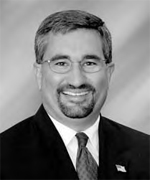September 10, 2009
What’s Important in Your Life?

By Curt Ford
Nash Nash Bean & Ford
Facing difficulties in life sharpens our focus. When tragedy strikes, we recognize what’s important in our lives: our family, our friends, and our values.
Henry Wadsworth Longfellow, the famous 19th century American poet, said “Into each life some rain must fall.” We have all had “rain” in our lives. Our tragedies typically are quite personal: the death of someone close to us, a life-threatening illness, or a violent crime. Sometimes our tragedies are shared by countless others: hurricanes, wildfires, earthquakes, terrorist attacks, tornadoes, or floods. But, regardless of the type of tragedy, our thoughts immediately go to what’s most important in our lives.
“Estate planning” deals with the passing of assets from one generation to the next. But, the next generation in estate planning, “Legacy Planning,” deals not just with passing material wealth, but also what’s most important in our lives. Legacy Planning relates to passing our “wealth” in the form of our values, wisdom, guidance, and protection, as well as monetary assets. We recognize this when we are confronted with important events.
A Family Wealth Trust passes on your true wealth. the Family Wealth Trust encompasses one of two protection levels: The Family Access Trust and the Family Sentry Trust. Either way, each trust protects your children better than just handing them the nest egg you worked a lifetime to create.
The Family Access Trust provides divorce protection by keeping the inheritance separate from your child’s other assets. For this reason, the trust can provide protection for your child even when you cannot be there to do so yourself. This trust still gives your child unfettered access to the inheritance, which may be the perfect choice if your child is mature and savvy.
Another option is the Family Sentry Trust, which offers an additional level of protection. The Family Sentry Trust offers all the divorce protection of the Family Access Trust, but it also provides another layer of creditor protection and management. When you can no longer be there to protect your children, the trust may be the next best thing. For example, the Family Sentry Trust can protect your child’s inheritance in the following situations:
- A political activist, going door to door, slips on your son’s steps and files suit against him.
- Your daughter lends her car to a friend who is involved in accident because the brakes failed. Both her “friend” and the occupants of the other car involved file suit against your daughter.
- Your son hears about a “no-lose” investment. Having little experience managing assets, your son invests in the next Enron.
Regardless of the protection level you choose, a Family Wealth Trust can shield those left behind from the risks of everyday life, while passing on your true legacy and values. A qualified estate planning attorney focusing on Legacy Planning can help you achieve your goals.
Nash Nash Bean & Ford are members of the American Academy of Estate Planning Attorneys and the National Academy of Elder Law Attorneys. To receive a copy of our most recent newsletter “Your Estate Matters” or for a free consultation on Estate or Long Term Care Planning, call 309-944-2188, 309-762-9368 or 1-800-644-5345. You may also contact our firm by email at info@nashbeanford.com or visit our web site at http://www.nashbeanford.com.
The firm devotes its practice primarily in the areas of estate, business and tax planning and related areas of the law, as well as elder law and trust administration and probate. We offer guidance and advice to our clients in every area of estate planning.
This column is designed for general information purposes only, and is not intended, nor should be construed or relied upon, as legal advice. Please consult your attorney if specific legal information is desired.
Filed Under: Finance
Tags: American Academy Of Estate Planning Attorneys, American Poet, Divorce Protection, Earthquakes, Elder Law Attorneys, Estate Planning Attorneys, Family Wealth, Floods, Henry Wadsworth Longfellow, Hurricanes, Important Events, Important In Your Life, Inheritance, Material Wealth, Monetary Assets, Nash, National Association Of Elder Law Attorneys, Nest Egg, Perfect Choice, Sentry, Tornadoes, Tragedies, True Wealth, Violent Crime
Trackback URL: https://www.50pluslife.com/2009/09/10/what%e2%80%99s-important-in-your-life/trackback/


